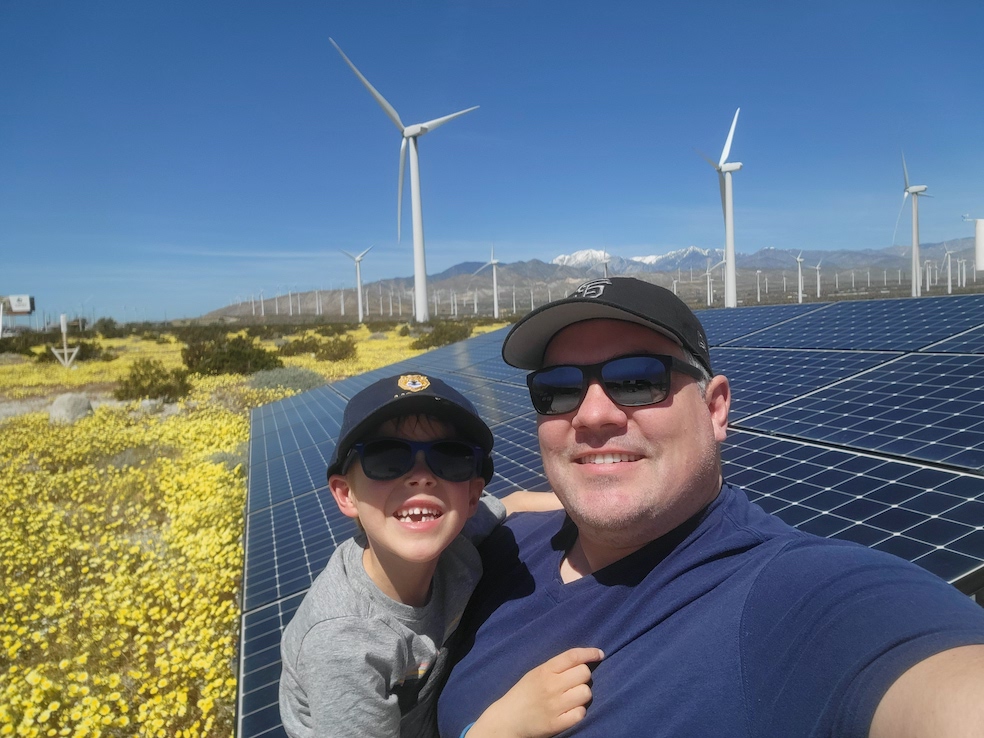Five Questions with College of Business Alum & Renewable Energy Advocate, Brandon Reinhardt

In 2005, while pursuing a business administration degree at Chico State, Brandon Reinhardt read the University’s Book in Common for that year—Plan B by Lester Brown. The book, which is about how renewable energy sources can combat climate change, stuck with Reinhardt and simmered in the back of his mind. He graduated in 2007 and began working in real estate development, initially specializing in developing property into affordable housing. However, the Book in Common, along with Al Gore’s An Inconvenient Truth, had ignited something inside of him that would not go away. Finally, in 2015, he got his chance to break into the renewable energy industry when he took a job at BayWa r.e. Company, a German company that develops clean energy solutions around the globe. Since getting into the field, he has been a part of projects that have created enough renewable energy to power over half a million homes, something he is grateful to be able to tell his children about.
Reinhardt is also grateful for his experience at Chico State. After initially attending West Valley Community College, he decided to transfer to Chico State at the last minute because he had several friends who were students. He had considered majoring in kinesiology, but the relationships he built with College of Business faculty during his first classes made business a logical choice.
Reinhardt misses the collegiate lifestyle and social aspects of the University—he fondly calls these good old days his pre-tirement. Now married with a family, he notes that social activities have to be scheduled three weeks in advance. I caught up with Reinhardt to discuss his career and his memories of campus.
How does a finance major get into clean energy?
I was working in affordable housing solutions at the time, which is something I felt pretty passionate about. And sometime around 2013 or 2014, I read a book called The Sixth Extinction, which rekindled the same feelings when I read Plan B and watched An Inconvenient Truth.
So, while affordable housing is extremely important, it is kind of second tier if there is no planet to live on. I started networking and talking to people in this industry. I was fortunate enough to get a start at a company that went under in 2016, but I was able to quickly move on to where I’m at now (BayWa r.e.). They historically have called this space the solar coaster because it has been volatile, but it is feeling pretty stable at the moment.
What does BayWa r.e. do?
The company is a renewable energy developer. We find suitable land, get it under contract, and then and get through the regulatory hurdles to build power plants made out of solar, wind, and battery storage. Clean energy is created on the property and then sold back to the power grid—either to utility companies or even corporations like Google and Apple. As you might imagine, there is a lot of research done to find space that both produces enough energy to make it worth it and will get approved.
Our power plants typically generate 100 megawatts of energy or more, so they are big operations. The batteries, for example, look like shipping containers. So, you might see five acres of what looks like shipping containers, but they are giant batteries storing energy.
The company is global and has a presence in 33 countries, but I work for the USA entity and I love it. I’m super excited to go to work every day and thankful I get to do something that contributes to mitigating climate change.
What is the state of clean energy right now? What more can we do to get the planet off fossil fuels?
I think we’re definitely turning in the right direction. It’s more just a question of how fast are we going to get there. It’s interesting because back in the day, renewable energy was kind of a side thing that no one really took seriously. But now I think we’re a pretty dynamic threat to the oil and gas industry, to the point where they’re worried about it.
Of course, that creates a challenge because there is more money on lobbying to slow clean energy down, which is unfortunate because there is no reason it can’t be moving faster. Part of my job is to strategize how to work against some of the misconceptions out there.
Take me back to Chico State, how did you settle on the finance option and what led you to this career?
I didn’t know exactly what I wanted to do, like a lot of students, so I decided it would benefit me long-term to pursue a major like finance. I was generally a little better at math than other subjects and figured finance was a good thing to know.
Then, I was in Professor Jack Hames’ Principles of Real Estate course and I just became enamored with all the content. He was positive and uplifting and he got me motivated and interested in the topic of real estate.
What would you say to current Chico State students?
I think the biggest thing is just to be curious. Figure out what your passions and motivations are and then kind of work backward from there, because I think there’s a ton you can achieve by figuring out what you love instead of worrying about a job. Even though I chose finance, I still had a strong interest in fighting climate change in the back of my mind and somehow, I was able to make it work. So, I would say follow your passion even if you don’t know exactly what you want to do, there is a good chance you will figure it out later.


